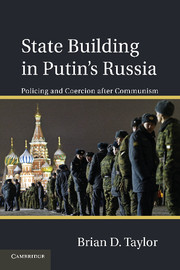Book contents
- Frontmatter
- Contents
- List of Figures, Tables, and Maps
- List of Abbreviations
- Acknowledgments
- Note on Transliteration and Translation
- Introduction
- 1 Bringing the Gun Back In
- 2 The Power Ministries and the Siloviki
- 3 Coercion and Capacity
- 4 Coercion and Capacity
- 5 Coercion and Quality
- 6 Coercion and Quality
- 7 Coercion in the North Caucasus
- 8 State Capacity and Quality Reconsidered
- Appendix A Publication Abbreviations
- Appendix B Interview Index
- References
- Index
- References
6 - Coercion and Quality
The State and Society
Published online by Cambridge University Press: 04 February 2011
- Frontmatter
- Contents
- List of Figures, Tables, and Maps
- List of Abbreviations
- Acknowledgments
- Note on Transliteration and Translation
- Introduction
- 1 Bringing the Gun Back In
- 2 The Power Ministries and the Siloviki
- 3 Coercion and Capacity
- 4 Coercion and Capacity
- 5 Coercion and Quality
- 6 Coercion and Quality
- 7 Coercion in the North Caucasus
- 8 State Capacity and Quality Reconsidered
- Appendix A Publication Abbreviations
- Appendix B Interview Index
- References
- Index
- References
Summary
There is no more effective mechanism for fighting corruption than the development of civil society and freedom of the press.
Vladimir Putin, February 2007The quality of Russian state coercive organs is generally low. Power ministries employees tend to work for their own interests or serve the powers that be rather than working for the interests of the population. Corruption and predation are widespread among law enforcement officers, and the rule of law is weak. Putin admitted toward the end of his second term that the fight against corruption had gone “badly” and lamented that there was no “reaction from civil society” to corruption. With this lament, Putin echoed his silovik ally Viktor Cherkesov, head of the drug control agency (FSKN), who wrote in 2007 that the best option for Russia would be the transformation into a “normal civil society,” but doubting the likelihood of that possibility and fearing another state collapse, argued that it was necessary for the “Chekist corporation” to unify and take the lead role in rebuilding Russia.
Putin is correct, as he stated in 2007 in the epigraph to this chapter, that civil society and the press are important weapons for combating corruption. However, Putin's actions as president seemed to be guided by Cherkesov's conviction that, since civil society was weak, the Chekists (secret police personnel and veterans) had to step in to save Russia.
- Type
- Chapter
- Information
- State Building in Putin’s RussiaPolicing and Coercion after Communism, pp. 204 - 249Publisher: Cambridge University PressPrint publication year: 2011



